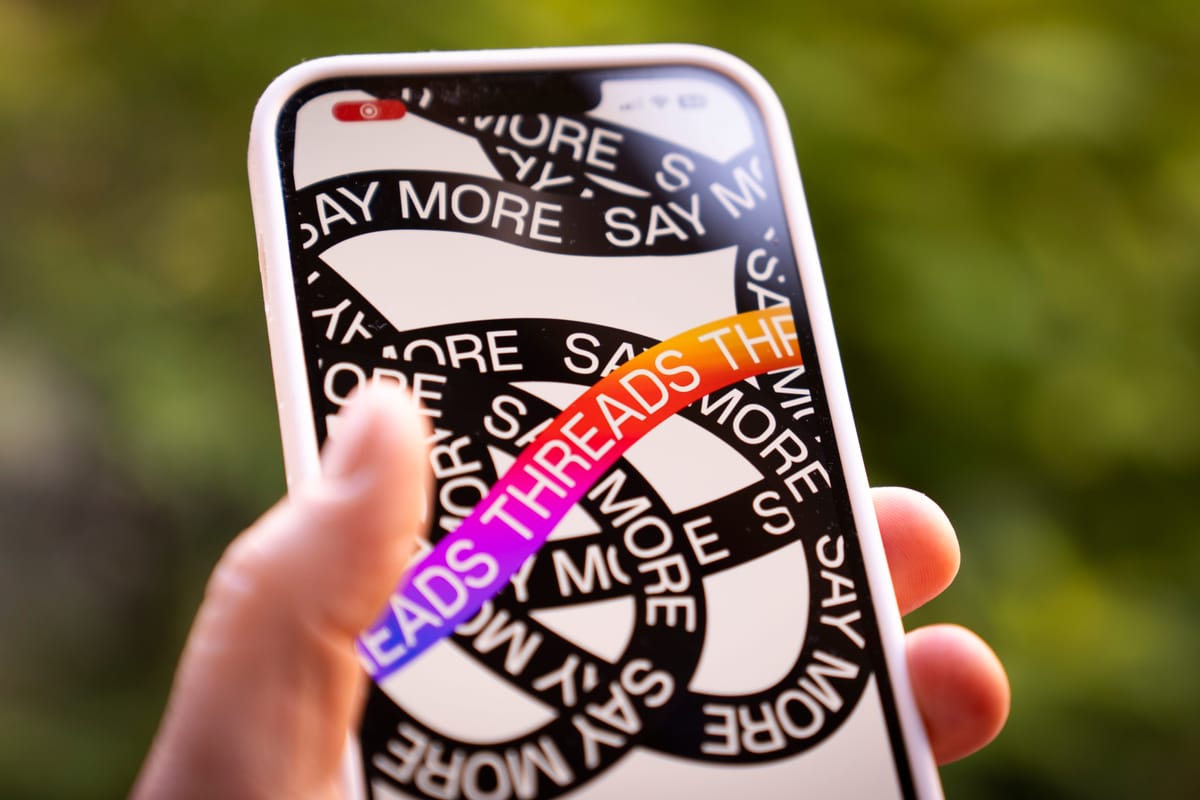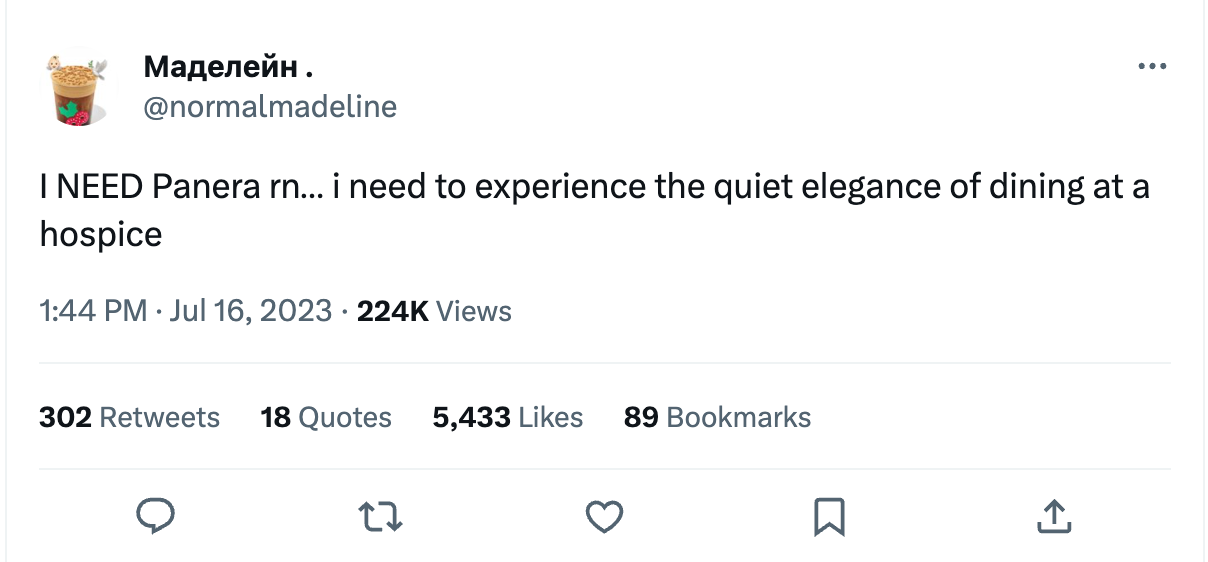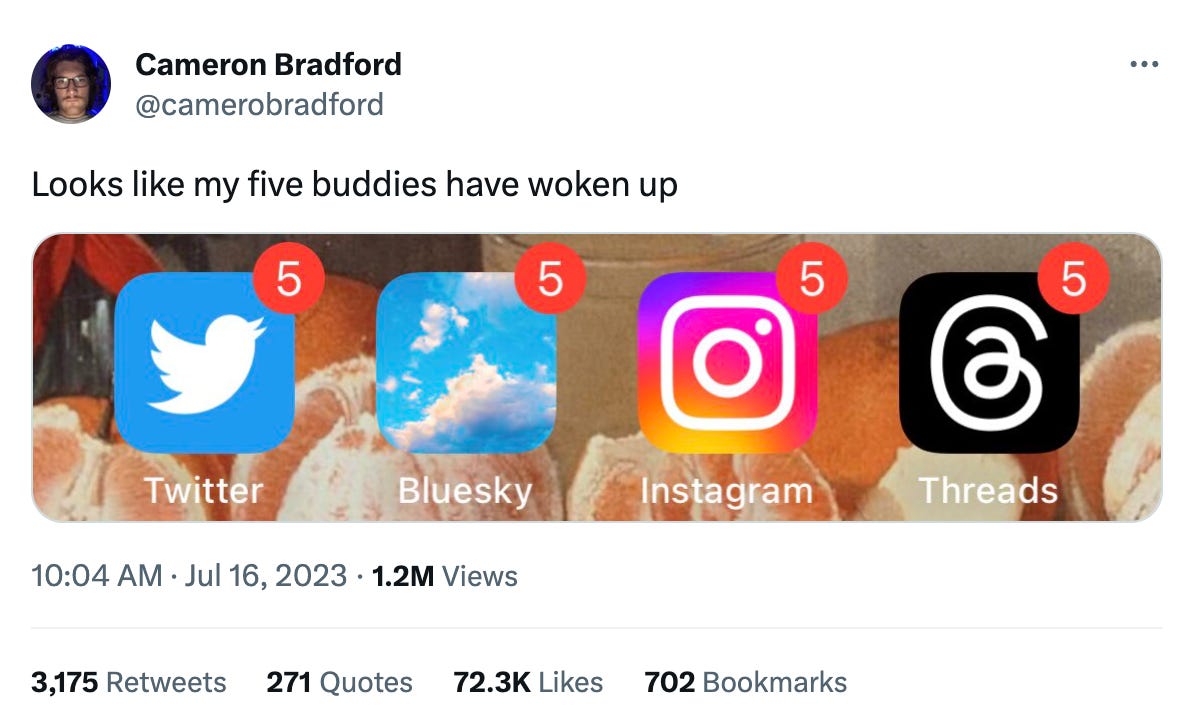Five reasons Threads could still go the distance
One week later, engagement is down — but the prize is still there for the taking

I.
On July 5, Meta released Threads into the world. Its arrival came after months of anticipation, but ultimately a bit earlier than Meta had planned. Elon Musk’s characteristically self-defeating move to limit free users to viewing a small number of tweets each day had given Meta an unusually opportune moment to strike, and it seized the moment.
The outsized success that followed — Threads was the fastest app to hit 100 million downloads, and later blew past 150 million — came as a surprise to almost everyone involved. That includes the app’s makers at Meta, who hadn’t built a homegrown hit this big since Facebook itself.
It was not for lack of trying. The company has released well over a dozen social apps over the past decade, many of them springing from a standalone division of the company devoted to that purpose. But few of them, if any, acquired millions of downloads. Even when it was attempting to copy the success of others, as it did with now-forgotten Snapchat clones like Poke and Slingshot, Meta mostly couldn’t get them off the ground.
I mention all this context because, as the early enthusiasm for Threads begins to fade, Meta is facing more questions about whether the app is here to stay. The analytics firm SimilarWeb estimated that Threads users had fallen from 49 million people 10 days ago to 23.6 million today, with time spent in the app declining from an average of 21 minutes per day to 6 minutes during the same period.
While third-party estimates are never totally reliable, these figures seem consistent with my own Threads experience. In those first few days, nearly everything I posted generated hundreds of likes and new followers; my phone vibrated so much that I could watch its battery drain in real time. This week, though, the response has been notably more muted.
So what’s going on?
In the New York Times, Mike Isaac noted that the notorious flop Google+ once claimed 90 million users, only to fall apart shortly after reaching those heights. I thought the comparison was worth raising: every social network struggles to retain users over time, and the bare-bones, 1.0 version of Threads displays little on the surface to suggest how it could overtake a much more established rival like Twitter.
It’s always a fool’s errand to judge the prospects of a new social network a couple weeks into its history. At the same time, if Threads does live up to its creators’ hopes, bringing decentralized apps into the mainstream, it could reshape the consumer internet in profound ways.
For that reason, I feel compelled to offer some early thoughts on why I believe Threads is on its way to fully supplanting Twitter in the role that company once played in shaping public conversation.
II.
One, Threads proved decisively the demand for a new text-based conversation app. Until this month, it was unclear that tens of millions of people even wanted something Twitter-like in their lives. Twitter itself has been in a period of steep decline, and the various clones that have sprung up in its wake have stalled out in the low millions of users. That Threads attracted so many downloads in so short a period offers compelling evidence that lots of people have been waiting for a company to do public conversations the right way.
Two, Threads immediately attracted the sort of high-profile user base that made Twitter so addictive for so long. Within days, my feed was populated with posts from athletes like Shaquille O’Neal, journalists like Katie Couric and Ezra Klein, and comedians like Kathy Griffin. They brought an instant legitimacy to Threads that rivals like Mastodon never quite cracked. Other Twitter clones, particularly the decentralized ones, have struggled to persuade people that they aren’t just for nerds. Threads never had that problem.
Three, Instagram can serve as a long-term growth driver for Threads. One of the most impressive things about the Threads launch was how it connects to Instagram. A badge on your Instagram profile lets everyone know how early you joined Threads, spurring others to race to create accounts of their own. And from the start, Threads could be shared to Instagram stories with a couple of taps, bridging the two apps together in a smart and useful way. As both apps evolve, I expect we’ll see many more touches like this, with each leveraging its own strengths to promote the other.
Four, Meta still has many other growth levers it can pull — many of which simply involve building basic features the user base has already requested. It will soon let users post and browse from the desktop, for example. It will let users browse a feed of posts created only by users they follow — a must for news junkies. Once it works through various data privacy issues, Threads will come to the European Union, with its hundreds of millions of potential users. (It’s a good sign for Meta that EU citizens are so intent on using it the company has had to block them at the VPN level.)
Meta will also be able to promote Threads across its family of apps, in ways both expected and not. What happens once public figures on Facebook can add their most recent Threads posts to their pages? I bet we’ll find out.
Five, Twitter’s deterioration continues to accelerate. Ad revenue is down by 50 percent, according to Musk, and — despite the company choosing not to pay many of its bills — the company is losing money. Rate limits continue to make the site unusable to many free users, and even some paid ones. Spam is overwhelming users’ direct messages so much that the company disabled open DMs to free users. The company has lately been reduced to issuing bribe-like payouts to a handful of hand-picked creators, many of whom are aligned with right-wing politics.
If that’s not a death spiral, what is? In Puck, William Cohan has written persuasively that Twitter could soon be subject to involuntary bankruptcy. And while that could be in Musk’s financial interests — making billions of dollars in debt disappear — the resulting chaos seems unlikely to restore the site to its former usability.
III.
So that’s the case for Threads working out in the end. The demand is there, the product is good, and its chief rival is circling the drain. (Other rivals don’t seem to be faring much better; Bluesky, which had been my favorite Twitter alternative in recent weeks, has been mired in internecine conflict over the past week related to the use of racial slurs in user names. Even worse, from a growth standpoint, is that the app remains invite-only.)
Of course, lots could still go wrong for Meta. I’m particularly focused on what kind of posts are ultimately favored by Threads’ ranking algorithms.
Instagram head Adam Mosseri drew headlines for saying the company is “not going to do anything to encourage” posting about politics or “hard news.” To me, this sounded mostly like marketing — “come use our app where everyone is arguing about politics” likely would not have drawn 100 million people to download the app in a week. I suspect Threads will ultimately lean into whatever its users are doing, even if it means hosting lots of fractious debates about democracy and fascism.
But if Threads winds up writing Mosseri’s viewpoint here into the code, the app could be sapped of its lifeblood. Threads doesn’t only have to be about news, just as Twitter wasn’t. But the best version of Threads is an app where people go to learn about and discuss what’s happening in the moment, news included, and absent that the feed is going to feel like one more overstuffed shopping mall for a company that already has plenty of those. (The earliest days of Threads, when the timeline was dominated by brands posting cringey engagement-bait, offer a good roadmap for what the company should avoid.)
Ultimately, despite encroaching doubts among critics, Meta CEO Mark Zuckerberg seems unfazed.
“I'm very optimistic about how the Threads community is coming together,” he wrote in a Threads post today. “Early growth was off the charts, but more importantly 10s of millions of people now come back daily. That's way ahead of what we expected.”
Indeed, it’s a rare thing for any social network to claim tens of millions of daily active users — much less one that is barely more than a minimum viable product. BeReal, one of the more prominent upstarts of the past couple years, announced it had 20 million daily users in April — and I imagine that number is smaller now.
To Zuckerberg, the concept has been proved out. The rest is simply an execution problem.
“The focus for the rest of the year is improving the basics and retention,” he wrote. “It'll take time to stabilize, but once we nail that then we'll focus on growing the community. We've run this playbook many times (FB, IG, Stories, Reels, etc) and I'm confident Threads is on a good path too.”
Elsewhere in Threads: The company said it would impose rate limits after many users began complaining about spam in their replies. There’s no Twitter-style hard limit on posting, though.
Governing
- The FTC opened an investigation into OpenAI over a prior leak of customer payment information, and concerns that ChatGPT is harming people’s reputations by generating false information. (Cat Zakrzewski / The Washington Post)
- China loosened some of the more stringent requirements for generative AI providers in its finalized regulatory guidelines, which are due to go into effect on August 15. The country’s top regulator revised the guidelines to help Chinese AI firms better compete with the U.S. and others. (Sarah Zheng, Zheping Huang and Jane Zhang / Bloomberg)
- Columbia University’s Knight First Amendment Institute sued Texas over its TikTok ban, saying it unconstitutionally limits research and education use cases for public university academics. (Sapna Maheshwari / The New York Times)
- The U.S. Appeals Court for the 5th Circuit temporarily blocked a lower-court ruling limiting the Biden administration’s contact with social media companies over alleged free speech violations. Republican attorneys general brought the case, claiming White House officials have been stifling speech by labeling it misinformation. (Brendan Pierson / Reuters)
- The U.S. Appeals Court for the 9th Circuit denied the FTC’s attempt to temporarily block Microsoft’s Activision Blizzard acquisition, paving the way for the two companies to merge. The FTC is still pursuing an appeal to block the deal after losing its case last week. (Jordan Novet / CNBC)
- Sony agreed to a 10-year deal with Microsoft to keep Call of Duty on PlayStation following the Xbox maker’s antitrust victory over the FTC. (Tom Warren / The Verge)
- The U.K.’s Competition and Markets Authority pushed its deadline to block the deal to August 29, which gives regulators and Microsoft time to negotiate new deal terms. The CMA blocked the deal in May, but it’s now reconsidering after the FTC loss. (Tim Bradshaw / Financial Times)
- U.K. antitrust regulators formally launched an investigation into Adobe’s $20 billion Figma acquisition out of concern it could limit choice of software products for designers. (Reuters)
- EU regulators plan to open an investigation next week into Microsoft’s bundling of Office and Teams software products following a breakdown in negotiations. (Javier Espinoza / Financial Times)
- The Norwegian Data Protection Authority ordered Meta to stop targeting users with personalized advertising in the country starting in August for a three-month period. The temporary ban will be lifted if Meta implements opt-out options and complies with other data protection requirements. (Clothilde Goujard / Politico)
- FTC Chair Lina Khan defended herself against Republican lawmakers’ accusations she violated ethics laws and is waging an idealogical war on Big Tech during a contentious hearing last week. (Leah Nylen / Bloomberg)
- Twitter is suing four Texas-based entities over alleged data-scraping activity that it claims contributed to its new rate limits. (Reuters)
- Twitter asked a California court to terminate its FTC consent order after the agency began investigation the company for alleged violations of their data privacy agreement. Republican lawmakers accused Khan of “harassing” the company over standard document requests. (Cat Zakrzewski / The Washington Post)
- Barack Obama has filmed a series of TikTok videos for libraries across the U.S. to promote access to books and library services in light of increasing book-banning efforts from Republicans. (Sophia Nguyen / The Washington Post)
- New research into Facebook content moderation found that Meta’s ban on the “Boogaloo” anti-government movement in June 2020 ultimately failed. The level of Boogaloo-related content nearly returned to its original volume after just 18 months. (Brandy Zadrozny / NBC News)
- Russia has banned state employees from using iPhones over spying concerns in its growing feud with Apple, which has denied claims that it works with U.S. intelligence to provide surveillance tools. (Anastasia Stognei / Financial Times)
- Bluesky allowed users to include the N-word in their usernames and only addressed it days after it was reported, highlighting a critical moderation failure. (Igor Bonifacic / Engadget)
- Reddit removed years of users’ private conversations as part of a transition to a new chat infrastructure after only a one-week notice. (Matt Binder / Mashable)
- Legal scholars and patent authorities are pressing the courts and policymakers to address a looming question regarding the intellectual property rights of AI tools. The ambiguity around whether AI can be credited with a patent poses a potential legal nightmare. (Steve Lohr / The New York Times)
Industry
- Hollywood studios proposed a supposedly “groundbreaking AI proposal” that SAG-AFTRA’s chief negotiator said would grant them perpetual license to actors’ digital likenesses without compensation. It mirrors the plot of a recent Black Mirror episode. (Andrew Webster / The Verge)
- Google added support for 43 languages to its Bard chatbot and opened the software to more European countries and Brazil later this week in an effort to better compete with OpenAI’s ChatGPT. (Sam Schechner / WSJ)
- The Associated Press struck a two-year deal with OpenAI to license some of the wire service’s text archive for training in exchange for access to the firm’s tech and expertise. (Sara Fischer / Axios)
- A new lawsuit from a co-founder of Stable Diffusion maker Stability AI said he was tricked by his other co-founder into selling his 15% stake for $100 just three months before it raised more than $100 million. You’re not truly a unicorn until one of your co-founders sues you for stealing the idea.(Mark Bergen / Bloomberg)
- Meta announced a new more powerful and efficient text-to-image generator called CM3Leon (pronounced “chameleon”), but it did not say when or even if it plans to release it to the public. (Kyle Wiggers / TechCrunch)
- A test of Baidu’s new “Ernie” chatbot found it came up short against OpenAI’s ChatGPT running GPT-4, but it fared better when conversing in Chinese and was more adept at surfacing current events. (Chang Che and Olivia Wang / The New York Times)
- Popular AI-detection services often mark passages from the U.S. Constitution and the Bible as being written by generative chatbots, underscoring how ineffective most of these tools are. (Benj Edwards / Ars Technica)
- Journalist Kyle Chayka worked with a company called Writer to create a generative AI version of himself, highlighting the growing market for writing-specific AI tools that may one day automate large swaths of white-collar work. (Kyle Chayka / The New Yorker)
- Less experienced writers who used ChatGPT for workplace writing tasks produced higher-quality work in nearly half the time as those who didn’t use the tool, a new study in Science has found. AI tutors are going to do people a lot of good, I think. (Rhiannon Williams / MIT Technology Review)
- Many of the recent generative AI experiments from media organizations have resulted in flooding the internet with low-quality, repackaged content. It’s now clear some media bosses want to use these tools to do more with less. (Mia Sato / The Verge)
- Hopes that the current AI boom would help revitalize San Francisco’s declining downtown may be overly optimistic considering AI startups operate with small workforces relative to other software firms. (Anna Tong / Reuters)
- Elon Musk told prospective AI researchers that xAI was worth $20 billion and offered nine-figure compensation packages to lure high-profile talent away from Google, OpenAI and other competitors. (Reed Albergotti and Louise Matsakis / Semafor)
- Former workers at Twitter Africa said they still have not received their promised three months of severance pay more than seven months after being laid off. (Larry Madowo / CNN)
- Twitter’s new creator revenue-sharing scheme appeared to most benefit far-right influencers, including Andrew Tate and the owner of the “End Wokeness” account. (Taylor Lorenz / The Washington Post)
- Twitter CEO Linda Yaccarino brought with her a longtime PR professional named Joe Benarroch who now interfaces with reporters, although for the most part the company still responds to press requests with the poop emoji. (Max Tani / Semafor)
- Meta is porting some video editing features from Reels to the main Facebook app in an effort to keep the platform competitive with TikTok and YouTube. (Ivan Mehta / TechCrunch)
- Roblox employees have accused company leadership of ignoring growing racial and gender diversity problems, especially among the game platform’s executive ranks. CEO David Baszucki once dismissed a diversity-related question at an all-hands meeting by saying Roblox has a high bar for hiring. (Cecilia D'Anastasio / Bloomberg)
- Reddit is getting rid of its current coin and awards system so users will no longer be able to gift others Reddit Gold, but the company says it’s working on a approach to awards. (Jay Peters / The Verge)
- Merchants on Telegram can now accept in-app cryptocurrency payments thanks to the integration of the open source Wallet blockchain project. (Jamie Crawley / CoinDesk)
Those good tweets
For more good tweets every day, follow Casey’s Instagram stories.

(Link)

(Link)

(Link)
Talk to us
Send us tips, comments, questions, and Threads: casey@platformer.news and zoe@platformer.news.





